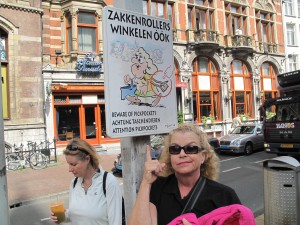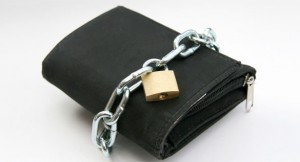This Just In
Travel Scams Around the World
 You may have heard of, or fallen victim to, the old “catch my baby while we pick your pockets” scheme. The new class of tourist rip-off makes that look like chump change.
You may have heard of, or fallen victim to, the old “catch my baby while we pick your pockets” scheme. The new class of tourist rip-off makes that look like chump change.
By Ray Pagliarulo, Reprinted from Budget Travel. See this photo? This is me I was a victim of a pickpocket in Amsterdam.
Orlando
Here’s a scam so bad even Mickey Mouse took a stand. Guests in hotels around Disney World have been finding pizza delivery menus conveniently slipped under their doors, but place an order and make the mistake of giving your credit card number and you’ll really pay. The phone number isn’t connected to a pizza parlor but to identity thieves. Disney World supported a law designed to crack down on the people handing out the fliers, but Orlando police say the problem persists.
Solution: If you’re craving a slice, get a recommendation from the hotel.
Vietnam
In Vietnam, open-ended bus tickets are the best way to travel at your own pace between Ho Chi Minh City and Hanoi, and the Sinh Tourist line is widely considered the best. So widely considered, in fact, its many impostors call themselves Sinh Tourist, too. Because of Vietnam’s lax intellectual property laws, it’s difficult to know which Sinh is the real deal. Take the wrong carrier, and you’ll get iffy service or, worse, an unexpected overnight stop at an overpriced hotel in cahoots with the bus line. “In summary,” says Stuart McDonald of travelfish.org, which travel advice site covering Southeast Asia, “it is a snake pit!”
Solution: Always use the bus company’s official website: thesinhtourist.vn.
New York City
New Yorkers are famously pushy, but Times Square’s so-called CD Bullies take the stereotype to new lows. A guy on the corner barks, “Check out my music!” and hands you what seems to be a free copy of his CD. He’s so nice, he’ll even offer to autograph it. But once the disc is in your hands, the aspiring rapper-suddenly surrounded by friends-refuses to take it back. You need to pay $10 or so to stop them from menacing you.
Solution:If the rapper won’t take the CD, gently place it on the ground and walk away.
Las Vegas
You go to Vegas to gamble, but you don’t want to risk your luggage, too. Sin City’s cab drivers are notoriously sketchy; one common scam involves a cabbie who insists on unloading your bags at your hotel or the airport. He says he’s in a rush, slams the trunk, and speeds away. Only later do you notice that one of your bags is missing? “When you’re coming to Vegas, you gotta be on your A-game with your stuff,” says Sergeant Jerry MacDonald of the Las Vegas PD. “Trust me when I tell you, they’ll snatch your luggage up faster than you can blink an eye.”
Solution: Note the driver’s name, cab number, and company when you get in; that way, if anything should happen, you have recourse.
United States
Some criminals who want your money are brazen enough to come right out and ask. An increasingly common scam involves hotel guests who receive a phone call in the middle of the night from someone claiming to work at the front desk. There’s been a problem with your credit card, they say. Could you read the number back one more time? The scammers are banking you’ll do something while half-asleep that you never should-give out credit card info by phone.
Solution: Hang up and call the front desk directly to make sure the request is legit.
Egypt
The pyramids around Cairo are one of the world’s best photo ops, and some tourists up the ante by posing on the back of a camel. Often, there are trainers standing by to coax the eight-foot-tall, 1,500-pound animals to lie down passively in preparation for riding. Once you’ve paid your $15 and mounted the beast, though, some touts will insist that you pay again to disembark and hold you, hostage, on the hump until you do.
Solution: “Never just get on a random guy’s camel,” says Kara Lucchesi of STA Travel. Stick to rides arranged via an established tour company.
Bali
Bali has an altogether unexpected kind of crook-the the monkeys who are so beloved that they have their own sacred forest and temple, where they’re allowed to roam free. These monkeys can have sticky fingers, going after food if it piques their interest-and, worse, valuables. Some enterprising locals are usually on-hand to coax the monkey to give back its plunder, though they’ll ask for a small tip of up to $3.50.
Solution: Seek out a staff member for assistance if a monkey snatches something from you. Better yet: hold on tightly to purses and backpacks and remove and secure glasses or anything else that can be easily purloined.
Rome
While some pickpockets make their living on not being noticed, others do it by getting aggressive and in your face-then ripping you off while you’re distracted. Rome is home to the infamous “fake baby” ruse, which sees a woman trip and throw a bundled doll into your arms, or just drop it on the ground, in an attempt to draw your attention away from pickpockets, often children, nicking your wallet or making away with your camera bag.
Solution: Beware of women who “throw” their babies or any other unusual distractions.
Bolivia
The cramped and congested passageways of Cochabamba’s famed La Cancha-the largest market in Bolivia-make it the perfect staging ground for “the squeeze.” Overwhelmed by the chaos and distracted by the overflowing stalls, you might find yourself suddenly pressed among a group of burly men, unable to move your arms. By the time the surprise wears off, the thugs have already rummaged through your pockets and disappeared.
Solution: Pay extra attention at cross-streets, which lend themselves to fast approaches and easy escapes.
Colombia 
It costs nothing to spend the day at Barú Island’s Playa Blanca, which with its white sands and crystal Caribbean surf might be Colombia’s most beautiful beach. Lying on your towel, you might feel a pair of warm hands on your shoulders, and hear the soothing voice of a woman saying to accept this massage as a gift. Tempting, but if you aren’t prepared to part with at least $10 in pesos, the price will be an especially histrionic fight.
Solution: Remember, there is no such thing as a free massage.
The Hot Dog Trick
Where: Airports
The Scam: The perp “accidentally” squirts mustard on you while eating a hot dog (it’s really a tube of mustard in a bun). Full of apologies, he clumsily tries to help clean up the mess while an accomplice walks off with your carry-ons.
Advice: Always place your bags between your legs in a public setting, whether you’re sitting or standing.
The Bracelet Scheme
Where: Rome and Paris
The Scam: “Someone, usually quite charming, comes up to you offering directions or sightseeing advice. Suddenly, the person ties a woven bracelet around your wrist in a double knot, then demands payment. If you refuse, he screams that you’re stealing the bracelet,” says Karen Schaler, author of Travel Therapy. Victims are often so unnerved that they end up paying a handful of euros.
Advice: Beware of overly friendly people who approach you on the street offering courtesies you neither want nor need.
The Fake Palace Guides
Where: Bangkok
The Scam: Official-looking guides approach travelers in the streets surrounding Bangkok’s Grand Palace, away from the main entrance. They’ll tell you, convincingly, that the palace is closed to visitors that morning, but that they’d be happy to take you on a “private” tour.”
Advice: Ignore them, and check for yourself at the main gate. “In many countries,” says Anthony Dennis, editor of Travel + Leisure Australia, “it’s usually best to arrange for a certified guide through your hotel.”
1. Front Desk Credit Card Confusion Scam. This scam was very interesting to me. Please read!
Anyone who has tried to see a city in a day and a half or cram 2 days of work into a 12-hour business trip knows what that kind of marathon activity can entail.
Imagine that it’s the end of your long day of frenzy, and you’re settling in for the evening in your hotel room. You’re drifting off to sleep when the phone rings. It’s the front desk clerk asking for your help in verifying some information.
The “front desk clerk” (aka scammer) apologizes for the late hour but explains that at shift change some forms were left unfinished. She needs to confirm that the form she has is yours and that the information is correct.
She asks if the last four digits of your credit card are 5678. You groggily reach for your wallet and pull out the card. No, you say, those aren’t the last four digits.
Hmmm, she responds, seeming perplexed. She then asks if you could just read the card number to her. You’re sleepy so you don’t pause before responding when she asks for the expiration date as well.
With a joyous Aha, she tells you that she has found your form. She thanks you profusely, apologizes again and assures you that all the information is now straightened out.
You hang up and drift back to sleep, not realizing that you have just been scammed by a con artist.
It might only be when your credit card is declined the next time you use it that you realize you’ve been scammed.
Action: Never give your card number out over the phone at a hotel. Ask for the name of someone to speak to and tell the caller that you’ll come down in the morning to straighten it out. Don’t offer to call the desk from your room and then feel safe giving the card number. For all you know, the thief is calling from a temporarily abandoned room.
Tourist Scams in Europe
By Rick Steves
Many of the most successful scams require a naive and trusting tourist. The sneakiest pickpockets look like well-dressed businesspeople, generally with something official-looking in their hand. Lately, many are posing as tourists with fanny packs, cameras, and even guidebooks. Be wary of any unusual contact or commotion in crowded public (especially touristy) places. If you’re alert and aren’t overly trusting, you should have no problem. Here are some clever ways European thieves bolster their cash flow.
Slow count: Cashiers who deal with lots of tourists thrive on the “slow count.” Even in banks, they’ll count your change back with odd pauses in hopes the rushed tourist will gather up the money early and say “Grazie.” Also, be careful when you pay with too large a bill. Waiters seem to be arithmetically challenged. If given a large bill for a small payment, clearly state the value of the bill as you hand it over. Some cabbies or waiters will pretend to drop a large bill and pick up a hidden small one in order to shortchange a tourist. In Italy, the now-worthless 500-lire coin looks like a €2 coin — be alert when accepting change. Other coins (such as Turkey’s one-lira coin, worth 55 cents; and Thailand’s 10-baht con, worth 25 cents) also resemble a €2 coin.
Oops! You’re jostled in a crowd as someone spills ketchup or fake pigeon poop on your shirt. The thief offers profuse apologies while dabbing it up — and pawing your pockets. There are variations: Someone drops something, you kindly pick it up, and you lose your wallet. Or, even worse, someone throws a baby into your arms as your pockets are picked. Assume beggars are pickpockets. Treat any commotion (a scuffle breaking out, a beggar in your face) as fake — designed to distract unknowing victims. If an elderly woman falls down an escalator, stand back and guard your valuables, then…carefully…move in to help.
The “helpful” local: Thieves posing as concerned locals will warn you to store your wallet safely — and then steal it after they see where you stash it. If someone wants to help you use an ATM, politely refuse (they’re just after your PIN code). If a bank machine eats your ATM card, see if there’s a thin plastic insert with a tongue hanging out that crooks use to extract it. (A similar scam is to put something sticky in the slot.) Some thieves put out tacks and ambush drivers with their “assistance” in changing the tire. Others hang out at subway ticket machines eager to “help” you, the bewildered tourist, buy tickets with a pile of your quickly disappearing foreign cash. If using a station locker, beware of the “hood Samaritan” who may have his own key to a locker he’d like you to use. And skip the helping hand from official-looking railroad attendants at the Rome train station. They’ll help you find your seat…then demand a “tip.”
The attractive flirt: A single male traveler is approached by a gorgeous woman on the street. After chatting for a while, she seductively invites him for a drink at a nearby nightclub. But when the bill arrives, it’s several hundred dollars more than he expected. Only then does he notice the burly bouncers guarding the exits. There are several variations on this scam. Sometimes, the scam artist is disguised as a lost tourist; in other cases, it’s simply a gregarious local person who (seemingly) just wants to show you his city. Either way, be suspicious when invited for a drink by someone you just met; if you want to go out together, suggest a bar of your choosing instead.
Fake police: Two thieves in uniform — posing as “Tourist Police” — stop you on the street, flash their bogus badges, and ask to check your wallet for counterfeit bills or “drug money.” You won’t even notice some bills are missing until after they leave. Never give your wallet to anyone.
Young thief gangs: These are common all over urban southern Europe, especially in the touristy areas of Milan, Florence, and Rome. Groups of boys or girls with big eyes, troubled expressions, and colorful raggedy clothes play a game where they politely mob the unsuspecting tourist, beggar-style. As their pleading eyes grab yours and they hold up their pathetic message scrawled on cardboard, you’re fooled into thinking that they’re beggars. All the while, your purse, fanny pack, or backpack is being expertly rifled. If you’re wearing a money belt and you understand what’s going on here, there’s nothing to fear. In fact, having a street thief’s hand slip slowly into your pocket becomes just one more interesting cultural experience.
The found ring: An innocent-looking person picks up a ring on the ground in front of you, and asks if you dropped it. When you say no, the person examines the ring more closely, then shows you a mark “proving” that it’s pure gold. He offers to sell it to you for a good price — which is several times more than he paid for it before dropping it on the sidewalk.
The “friendship” bracelet: A vendor approaches you and aggressively asks if you’ll help him with a “demonstration.” He proceeds to make a friendship bracelet right on your arm. When finished, he asks you to pay a premium for the bracelet he created just for you. And, since you can’t easily take it off on the spot, you feel obliged to pay up. (These sorts of distractions by “salesmen” can also function as a smokescreen for theft — an accomplice is picking your pocket as you try to wriggle away from the pushy vendor.)
Leather jacket salesman in distress: A well-spoken, well-dressed gentleman approaches you and explains that he’s a leather jacket salesman, and he needs directions to drive to a nearby landmark. He chats you up (“Oh, really? My wife is from Omaha!”) and gives you the feeling that you’re now friends. When finished, he reaches in his car and pulls out a “designer leather jacket” he claims is worth hundreds of dollars, which he gives to you as a gift for your helpfulness. Oh, and by the way, his credit card isn’t working, and could you please give him some cash to buy gas? He takes off with the cash, and you later realize that you’ve paid way too much for your new 100 percent vinyl jacket.
Room “inspectors”: There’s a knock at your door and two men claim to be the hotel’s room inspectors. One waits outside while the other comes to take a look around. While you’re distracted, the first thief slips in and takes valuables left on a dresser. Don’t let people into your room if you weren’t expecting them. Call down to the hotel desk if “inspectors” suddenly turn up.
The stripper: You see a good-looking woman arguing with a street vendor. The vendor accuses her of shoplifting, which she vehemently denies. To prove her innocence, she starts taking off her clothes — very slowly. Once she’s down to her underwear, the vendor apologizes and she leaves. Suddenly all the men in the crowd find out that their wallets have “left,” too, thanks to a team of pickpockets working during the show.
The broken camera: Everyone is taking pictures of a famous sight, and someone comes up with a camera or cell phone and asks that you take his picture. But the camera or cell phone doesn’t seem to work. When you hand it back, the “tourist” fumbles and drops it on the ground, where it breaks into pieces. He will either ask you to pay for repairs or lift your wallet while you are bending over to pick up the broken object.
Talkative cashiers: The shop’s cashier seems to be speaking on her phone when you hand her your credit card. But listen closely and you may hear the sound of the phone’s camera shutter, as she takes a picture of your card.
Crooked cabbies: The scam you’ll most likely encounter in Europe is being overcharged by a taxi driver.
Credit card fraud, Risk zone: Worldwide
Drinks scam
Risk zone: Worldwide
Fake changes
Risk zone: China
Robbed fellow traveler scam
Risk zone: Southeast Asia
Tuk-tuk scam
Risk zone: Thailand and India
More Travel Safety Tips







